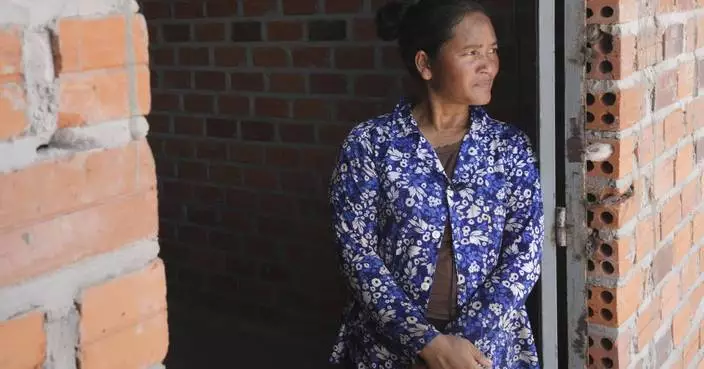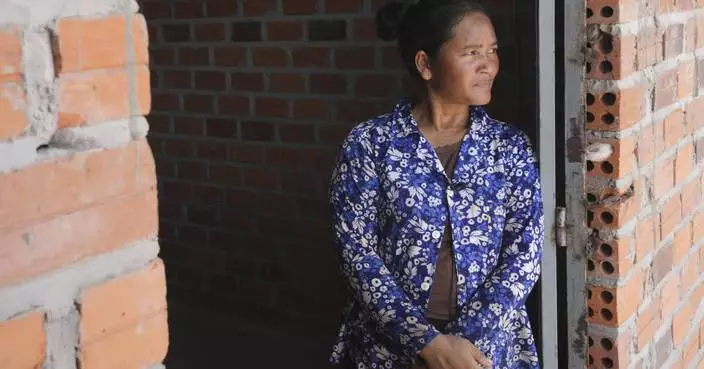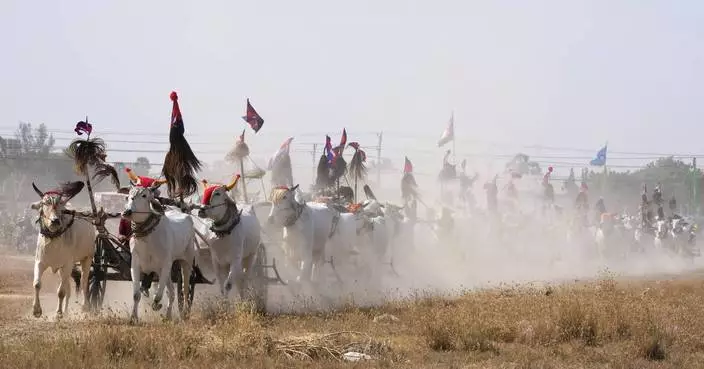Cambodia's government on Friday took initial legal steps to dissolve the country's main opposition party, the latest in a series of moves to gain an advantage ahead of next year's general election.
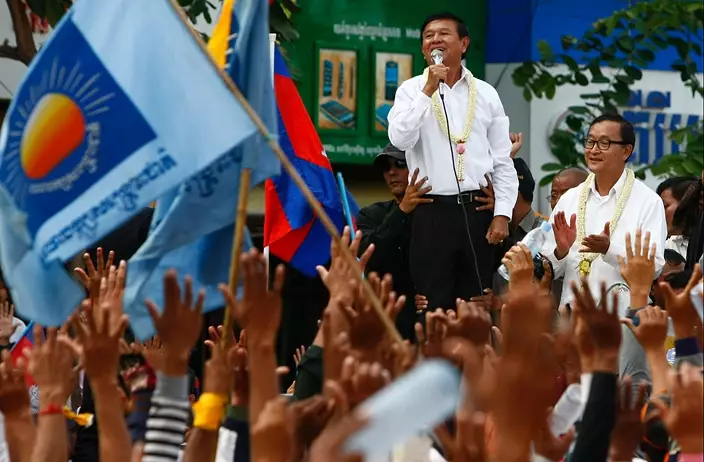
In this Dec. 22, 2013, photo, former party leaders of Cambodia National Rescue Party, Kem Sokha, second right, and Sam Rainsy, right, lead their party rally cheering with party flags in Phnom Penh, Cambodia. Cambodia's government on Friday, Oct. 6, 2017, took the initial legal steps seeking to dissolve the country's major opposition party, the latest in a series of moves to gain an advantage ahead of next year's general election. (AP Photo/Heng Sinith)
Interior Ministry spokesman Khieu Sopheak said the ministry filed a lawsuit with the Supreme Court asking for the Cambodia National Rescue Party to be dissolved on the grounds that it was involved in a plot to topple the government.
The court is likely to uphold the complaint, since the country's court system is widely considered to be under the political influence of the government of Prime Minister Hun Sen.
"This is a strongman's coup d'etat, with Hun Sen shamelessly transforming himself into a dictator for the whole world to see," said Phil Robertson, deputy Asia director for Human Rights Watch.
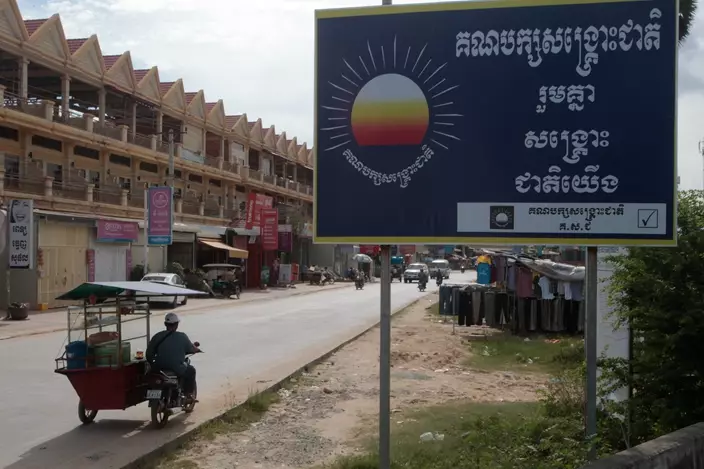
A signboard logo of the opposition Cambodia Rescue Party, CNRP, sticks on a sidewalk at the outskirts of Phnom Penh, Cambodia, Friday, Oct. 6, 2017. Cambodia's government on Friday took the initial legal steps seeking to dissolve the country's major opposition party, the latest in a series of moves to gain an advantage ahead of next year's general election. (AP Photo/Heng Sinith)
The CNRP is the only party aside from the ruling Cambodian People's Party with representatives in parliament, and no third party comes close in terms of popularity and support. The CNRP posed an unexpectedly strong challenge in 2013's general election and the government has since taken steps to tighten its grip on power.
Khieu Sopheak said the government had received "21 pieces of concrete evidence to prove that the opposition party has intentionally sought to topple the government through a 'color revolution.'" Hun Sen and his supporters have repeatedly warned that the type of pro-democracy popular movements that arose in the former Soviet Union and the Balkans in the early 2000s would cause chaos in Cambodia.
The CNRP has denied seeking to unlawfully or violently overthrow the government, saying the charge is politically motivated.
If the Supreme Court finds the opposition party guilty of violating the Political Party Law, not only would it be dissolved, but its leaders would be banned from involvement in politics for five years.
The ministry acted after it received complaints from two parties with no lawmakers in parliament that are generally believed to have been acting at the government's behest.
CNRP leader Kem Sokha was charged last month with treason for allegedly working with the United States to stage a "color revolution" to oust Hun Sen, who has held power for more than three decades.
His arrest has sharply escalated political tensions and raised questions over whether the upcoming elections could be free and fair.
"With this move, Prime Minister Hun Sen and the ruling CPP are killing Cambodian democracy by turning the July 2018 election into a bad joke," Robertson said. "The government's narrative that the opposition CNRP is leading a 'color revolution' is yet another dimension of the politically motivated lie used to justify a crackdown on anyone who dares make critical comments about the government."
Although he is being detained pending trial, a message posted on Kem Sokha's Facebook page reacted to Friday's move by the government, saying that: "No other power can overcome the power of the will of the people. May the Cambodian compatriots unite in demanding justice for all Cambodians."
Other opposition politicians were keeping a low profile and could not immediately be contacted.
The charge against Kem Sokha was based on videos from several years ago that showed him at a seminar where he spoke about receiving advice from U.S. pro-democracy groups. He could face up to 30 years in prison.
Kem Sokha had been expected to lead the CNRP in next year's election in a strong challenge against the ruling party.
In nationwide local elections in June, Hun Sen's Cambodian People's Party won most constituencies but received a weak majority of the popular vote, while the opposition party made gains.
In the past month, Hun Sen and his party have accelerated the use of legal and administrative measures to undermine critics and political foes.
After Kem Sokha's arrest last month, Hun Sen warned that the CNRP was at risk of being dissolved.
"If this party continues to protect and defend this traitor, it means this party is also involved in treasonous acts and there is no need to allow this party to exist in our democratic society," Hun Sen said in a speech. He said it did not matter if one party was dissolved because many other parties would take part in the election.
In other recent moves tightening the grip of his government, an independent English-language newspaper, The Cambodia Daily, was shut down after being accused of not paying a huge tax bill — an assessment it strongly disputed. More than a dozen radio stations that broadcast dissident voices or used programming from the U.S. government-funded Voice of America and Radio Free Asia were forced to stop broadcasting for alleged breach of regulations.
PHNOM PENH, Cambodia (AP) — Chinese Foreign Minister Wang Yi arrived in Cambodia on Sunday for a three-day official visit to reaffirm ties with Beijing’s closest ally in Southeast Asia. His visit is the last stop on a three-nation regional swing that also took him to Indonesia and Papua New Guinea.
He is visiting amid foreign concerns about two big Chinese-funded projects in Cambodia — a planned canal and a naval base — that critics allege could aid Beijing’s strategic military interests in Southeast Asia.
China is Cambodia’s most important ally and benefactor, with strong influence in its economy. That is illustrated by numerous Chinese-funded projects — particularly infrastructure, including airports and roads, but also private projects such as hotels, casinos and property development. More than 40% of Cambodia’s $10 billion in foreign debt is owed to China.
Wang is scheduled to have separate meetings with Prime Minister Hun Manet and his father, Hun Sen, now serving as president of the Senate after serving for 38 years as Cambodia’s head of government until he stepped down last year to be succeeded by his son. Wang was also granted a royal audience with King Norodom Sihamoni.
Hun Manet has shown no sign of deviating from his father’s pro-Beijing foreign policy. In August 2023, Wang visited Cambodia just days after Hun Sen announced he would step down as prime minister in favor of his eldest son.
Beijing’s support allows Cambodia to disregard Western concerns about its poor record on human and political rights, and in turn Cambodia generally supports Beijing’s positions on foreign policy issues such as its territorial claims in the South China Sea.
Cambodia has recently reiterated its determination to go ahead with the Chinese-financed 180-kilometer (112-mile) long, $1.7 billion Funan Techo Canal project across four provinces in the southern part of the country to connect the capital, Phnom Penh, to the Gulf of Thailand.
The plan has raised concern from neighboring Vietnam, where some scholars speculated the 100-meter (330-foot) -wide and 5.4 meter (18-foot) -deep canal could make it easier for China to send military forces southward, close to Vietnam’s southern coast. There are often frosty relations between Vietnam and its massive northern neighbor China, which aggressively claims maritime territory claimed by Hanoi and in 1979 staged a brief invasion.
The United States has also weighed in on the project, appealing for transparency on the part of Cambodia's government. Wesley Holzer, a U.S. Embassy spokesperson in Phnom Penh, was quoted as telling the Voice of America that “the Cambodian people, along with people in neighboring countries and the broader region, would benefit from transparency on any major undertaking with potential implications for regional water management, agricultural sustainability, and security,”
Hun Manet, speaking Thursday to government officials and villagers in southern Takeo province, dismissed the Vietnamese concern and vowed to push forward with the project, which he said would provide a huge benefit to Cambodia.
China also is involved with another project causing foreign concern, its Ream Naval Base on the Gulf of Thailand , which the United States and some international security analysts say is destined to serve as a strategic outpost for Beijing’s navy.
The Ream base initially attracted attention in 2019 when The Wall Street Journal reported that an early draft of an agreement seen by U.S. officials would allow China 30 years' use of the base, where it would be able to post military personnel, store weapons and berth warships.
Hun Sen in response repeatedly denied there was such an agreement, pointing out that Cambodia’s constitution does not allow foreign military bases to be established on its soil and declaring that visiting ships from all nations are welcome.
The base is situated on the Gulf of Thailand, adjacent to the South China Sea, where China has aggressively asserted its claim to virtually the entire strategic waterway. The U.S. has refused to recognize China’s sweeping claims and routinely conducts military maneuvers there to reinforce its status as international waters.
On Dec. 7, two Chinese naval vessels became the first ships to dock at a new pier at the base, coinciding with an official visit to Cambodia by China’s top defense official.
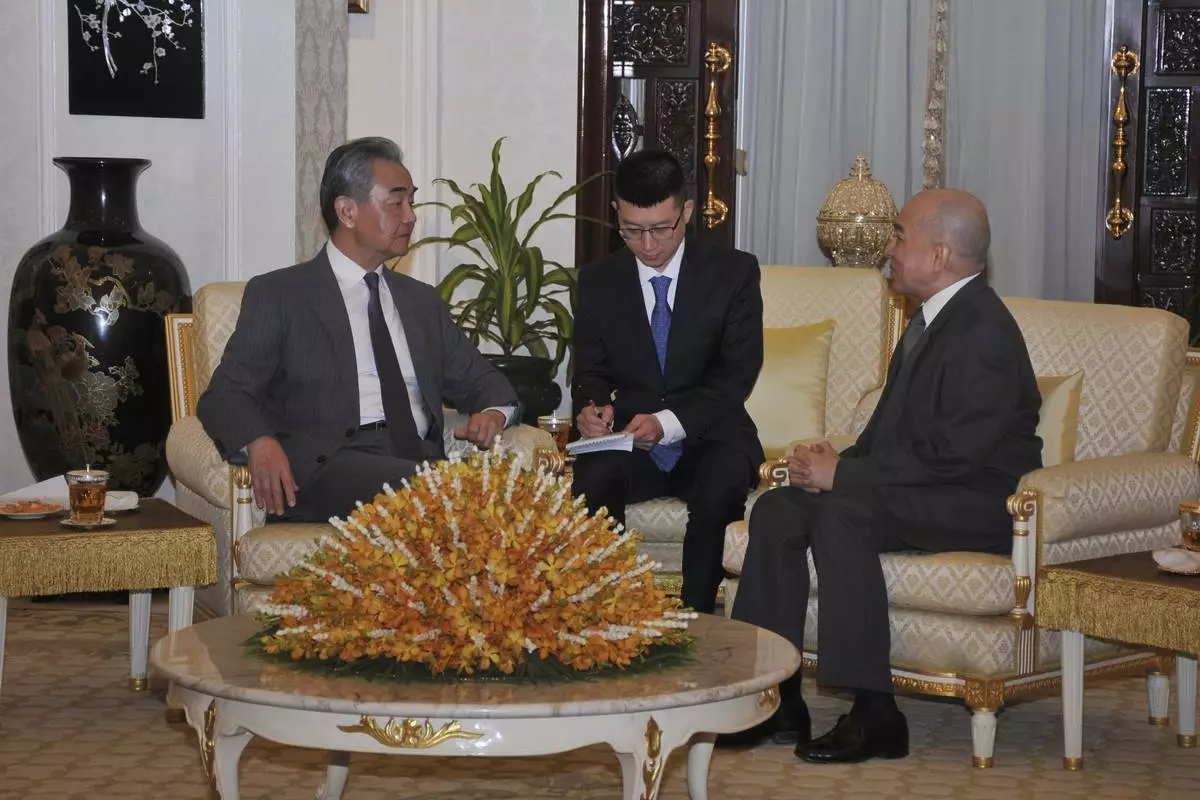
In this photo released by Agence Kampuchea Press (AKP), Chinese Foreign Minister Wang Yi, left, is welcome meeting by Cambodia's King Norodom Sihamoni, right, in Royal Palace, in Phnom Penh, Cambodia, Sunday, April 21, 2024. Wang Yi, arrived Cambodia to mark his 3 days official visit (21-23 April) Cambodia to reaffirm his country's commitment and to boost the already firmly tied to southeast Asian country, twice visited in the last eight months. (AKP via AP)
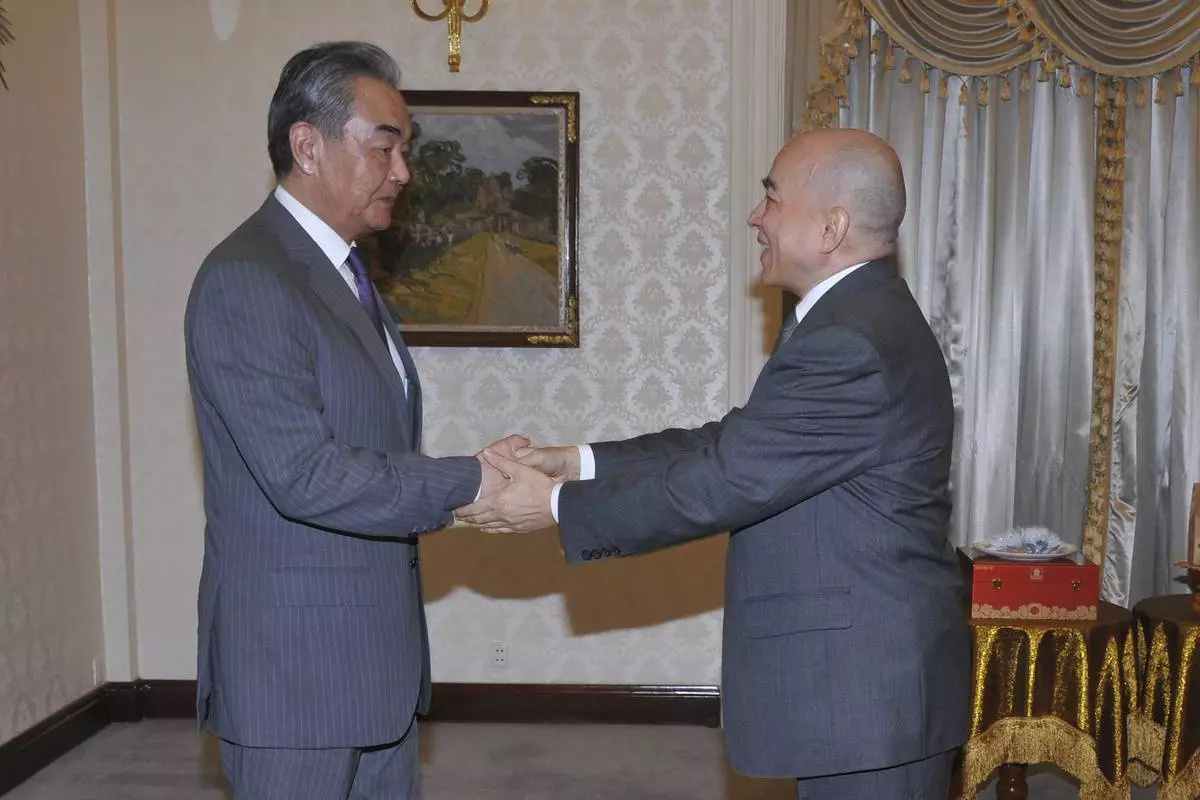
In this photo released by Agence Kampuchea Press (AKP), Chinese Foreign Minister Wang Yi, left, greets with Cambodia's King Norodom Sihamoni, right, in Royal Palace, in Phnom Penh, Cambodia, Sunday, April 21, 2024. Wang Yi, arrived Cambodia to mark his 3 days official visit (21-23 April) Cambodia to reaffirm his country's commitment and to boost the already firmly tied to southeast Asian country, twice visited in the last eight months. (AKP via AP)
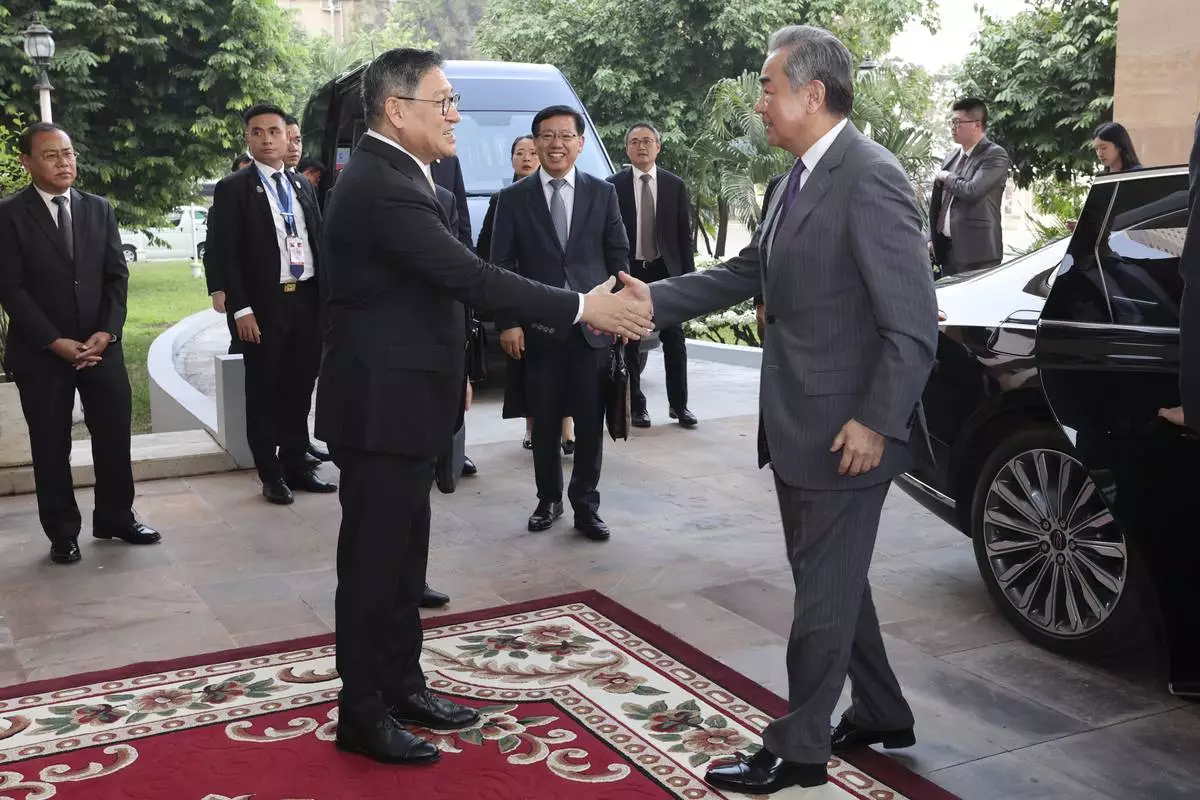
In this photo released by Agence Kampuchea Press (AKP), Chinese Foreign Minister Wang Yi, front right, greets with Cambodia's Foreign Minister, SOK Chenda Sophea, front left, in Phnom Penh, Cambodia, Sunday, April 21, 2024. Wang Yi, arrived Cambodia to mark his 3 days official visit (21-23 April) Cambodia to reaffirm his country's commitment and to boost the already firmly tied to southeast Asian country, twice visited in the last eight months. (AKP via AP)
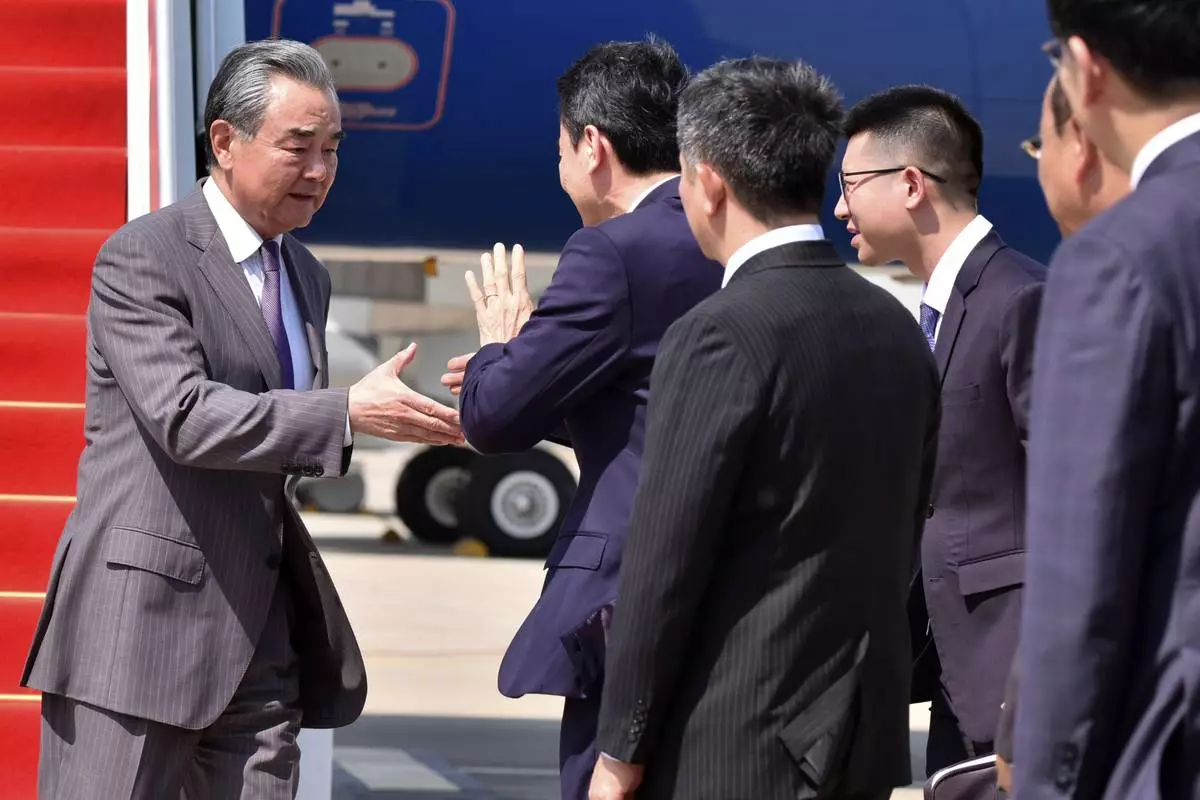
In this photo released by Agence Kampuchea Press (AKP), Chinese Foreign Minister Wang Yi, left. is greeted on his arrival at Phnom Penh International Airport in Phnom Penh, Cambodia, Sunday, April 21, 2024. (AKP via AP)
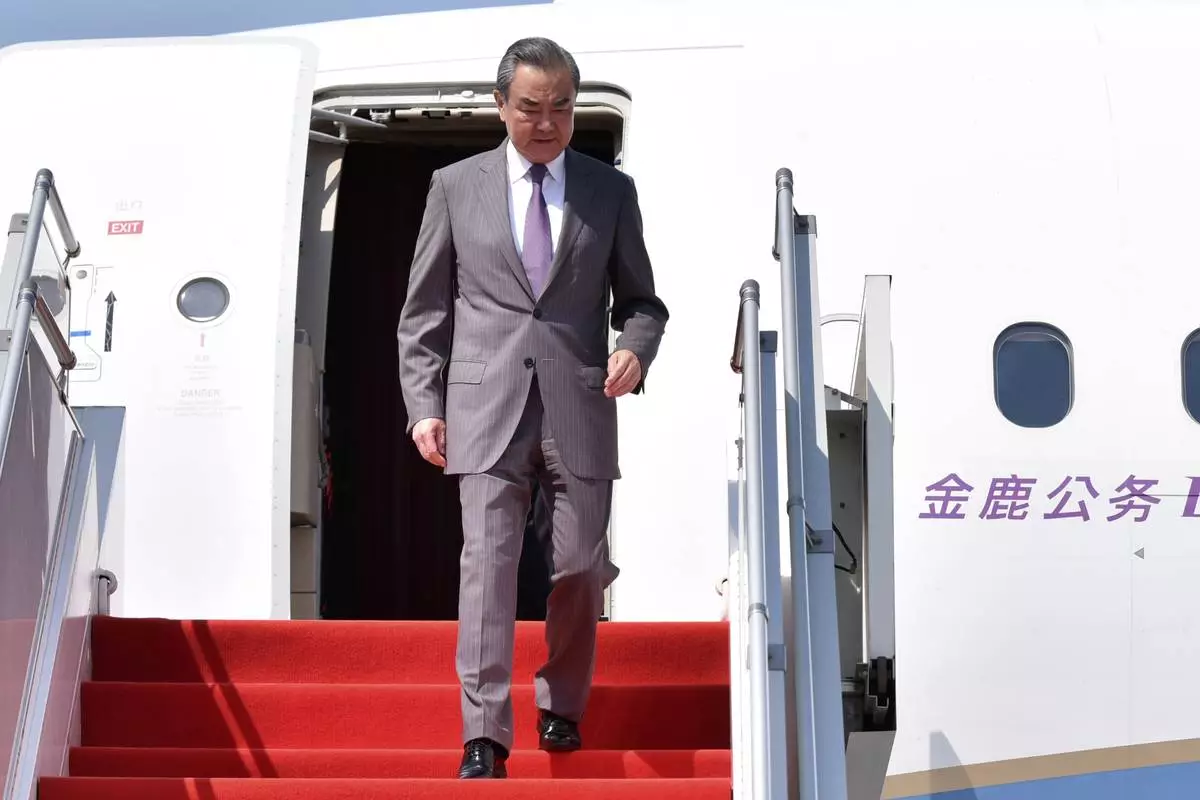
In this photo released by Agence Kampuchea Press (AKP), Chinese Foreign Minister Wang Yi arrives at Phnom Penh International Airport in Phnom Penh, Cambodia, Sunday, April 21, 2024. (AKP via AP)
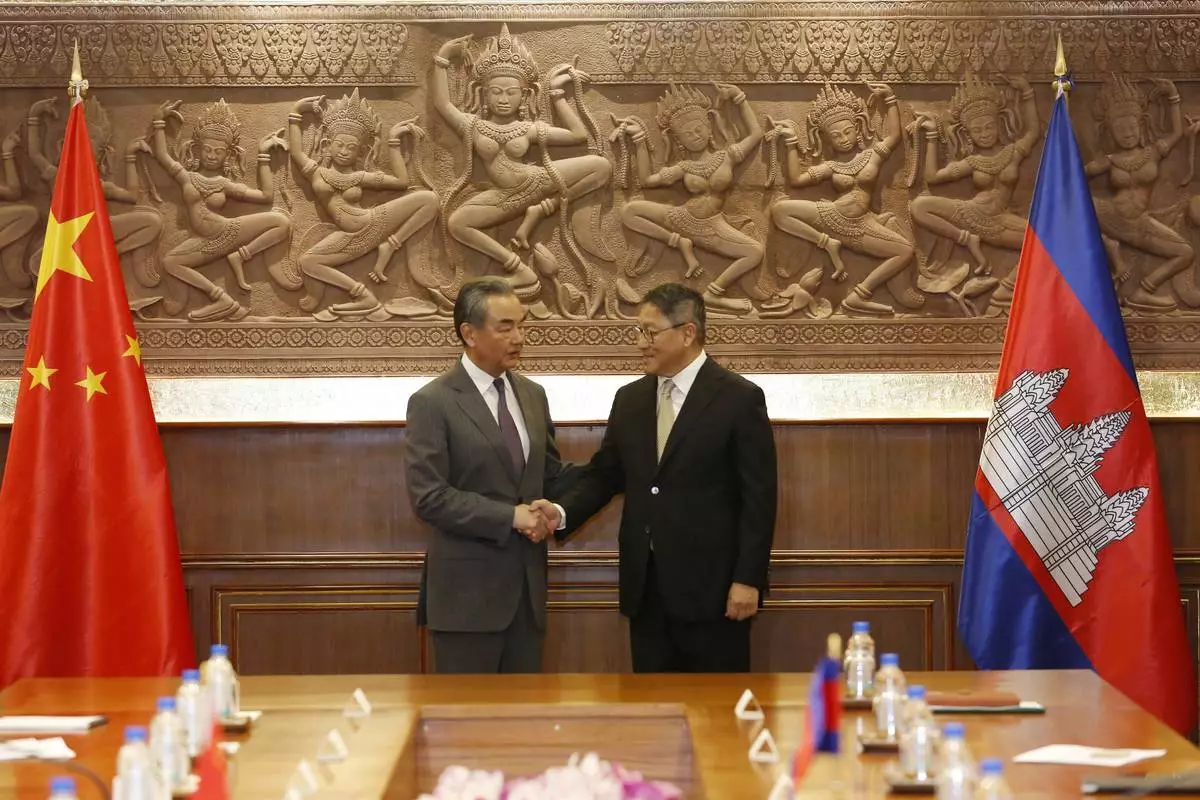
In this photo released by Agence Kampuchea Press (AKP), Chinese Foreign Minister Wang Yi, left, greets with Cambodia's Foreign Minister, SOK Chenda Sophea, right, in Phnom Penh, Cambodia, Sunday, April 21, 2024. Wang Yi, arrived Cambodia to mark his 3 days official visit (21-23 April) Cambodia to reaffirm his country's commitment and to boost the already firmly tied to southeast Asian country, twice visited in the last eight months. (AKP via AP)












